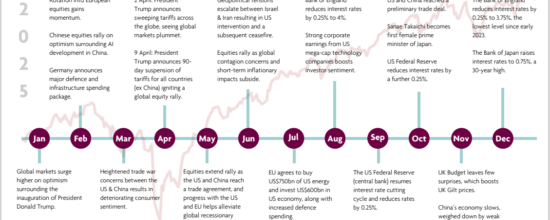Market Update: Markets pick up after a shaky start to the year
To download the January Market Update PDF | Word.
The US economy remains robust even though interest rates remain higher than they’ve been for years.
Despite a shaky start to the year, markets picked up in January, bolstered by technology stocks and hopes about the US economy. Crude oil prices rose on worries about potential disruptions to supplies through the Red Sea and escalating tensions in the Middle East.
The US Federal Reserve (Fed) held its key interest rate steady for a fourth consecutive meeting at 5.25% to 5.5%. Chair Jerome Powell said they probably won’t start cutting rates at the next policy meeting in March with inflation still running above the 2% target.
US consumer prices rose in December, driven by higher costs for housing, dining out and car insurance. Inflation increased at an annual pace of 3.4% , up from 3.1% in the previous month. Despite the surprise uptick, many analysts expect inflation to fall in the coming months.
The US economy continues to defy fears of a slowdown, with the labour market appearing to be in good shape as the year began. Employers added 216,000 jobs in December, while the unemployment rate was unchanged at 3.7%. Retail sales also rose more than expected in December, increasing by 0.6%.
UK economy rebounds
Market sentiment rose after the UK economy saw a modest rebound in November, although the threat of recession still looms. GDP rose by 0.3%, bouncing back from a drop of the same scale in October. Economists had expected a 0.2% increase.
UK inflation unexpectedly rose to 4% in December from 3.9% the month before. It’s the first increase for 10 months, dampening hopes that the Bank of England will lower interest rates in the coming months. One of the main contributors was a government increase in tobacco duty.
UK pay growth slowed again as the jobs market stalled, falling sharply from 7.3% to 6.6% in the three months to November. The number of job vacancies fell by 49,000 over the three months to December to 934,000, the 18th period in a row that openings have fallen.
China’s economic woes continue
China’s manufacturing sector contracted for a fourth straight month in a row during January as the economy continued to falter. Deflation remains a problem, with consumer prices falling for a third straight month in December, although the pace is moderating.
Despite government support, China’s property crisis worsened. New home prices fell at the fastest pace since February 2015 – the sixth straight month of declines. There was some good news for the world’s second-largest economy after exports rose 2.3% in dollar terms from a year earlier, while imports increased 0.2%.
Meanwhile, European markets moved higher after the European Central Bank (ECB) decided to keep interest rates unchanged at a record-high 4%. Eurozone inflation rebounded in December, jumping to 2.9%, up from 2.4% the previous month. The region’s labour market has also proved more resilient than expected, with unemployment falling back to a record low of 6.4% in November.



